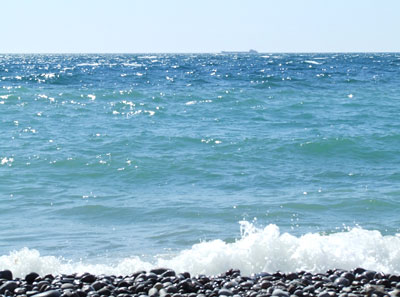17.03.10
Text:
Translation: RusNavy.com
Photo:
| Tell a friend | Print version |
|---|
"Pentagon's Black Sea strategy failed" - US expert
Director of Harvard Black Sea Security Program Sergei Konoplev in interview to REGNUM Novosti comments expert opinion that "Black Sea is the U.S. sea".

The Black Sea
Maritime cooperation between the U.S. and Russia began far back in the past. Few people know that as early as 1788 Russian Empress Catherine II appointed American officer Paul Jones a Russian Navy's Rear Admiral. Those who demur at that fact may read an inscription on granite memorial plaque in the very heart of St. Petersburg at the corner of B. Morskaya and Gorokhovaya streets. As a matter of fact, after service at the Black Sea under Russian colors Admiral Paul Jones founded the US Navy.
However, affairs of the past are unlikely the prime interest of present-day experts analyzing situation at the Black Sea region. Obviously, most of them concern about current plans of the U.S at this region.
Russia and the U.S. compete on Eurasian geopolitical chessboards with varying success and the Black Sea has recently transformed into a battlefield. Undoubtedly, the conflict between Russia and Georgia was actually a Moscow's message to American strategists – "come out of our backyard or you get fairings!" What Kremlin is anxious about and does the U.S. really nurse artful schemes in the Euxeinus Pontos which is antique name of the Black Sea?
In 90's the U.S. and their NATO allies were concerned with integration of Eastern Europe and then roared Balkan events. No one in America was interested in what happened in Russia's "near abroad" with all ensuing consequences. In addition, there were no bright characters in contrast to Europe – Vaclav Havel, Lech Walesa...
Sept 11 and subsequent military operations in Iraq and Afghanistan turned over many geopolitical postures including the U.S. attitude towards the Black Sea. Pentagon urgently needed countries to use their territories for force projection at theaters of operations. And then a sort of political earthquake thrilled Black Sea region. Turkey which had always been Washington's prime ally suddenly said "don't count on us". Romania and Bulgaria felt opportuneness and said "we're on". In the eyes of Americans, the region was cloven in two – old and new Europes. By the way, that was a vital error caused a split in North Atlantic coalition and isolated the U.S. in general and Republican Administration in particular.
Afterwards thundered "colored revolutions"; first in Tbilisi then in Kiev. And that was a great success both for Washington's democratic crusade and so called "integrated West". On the other hand, it was a warning bell for Moscow which kept in mind statement of Zbignew Brzezinski that Russia would no longer be an empire without Ukraine. Unfortunately (for Washington) and luckily (for Moscow), Ukraine and Georgia have wandered from the "democratic track" due to number of reasons which we are not going to analyze here.
To tell straight, Pentagon did try to develop a strategy in Black Sea region but failed. It is impossible to kill two birds with one stone – to get closer with Russia and to reach agreement with the disintegrated region sunken in its unresolved conflicts. And to top it all, Turkey continues to throw sand in the NATO's wheels pressing it out of the Black Sea. And Russia takes advantage of it all...



